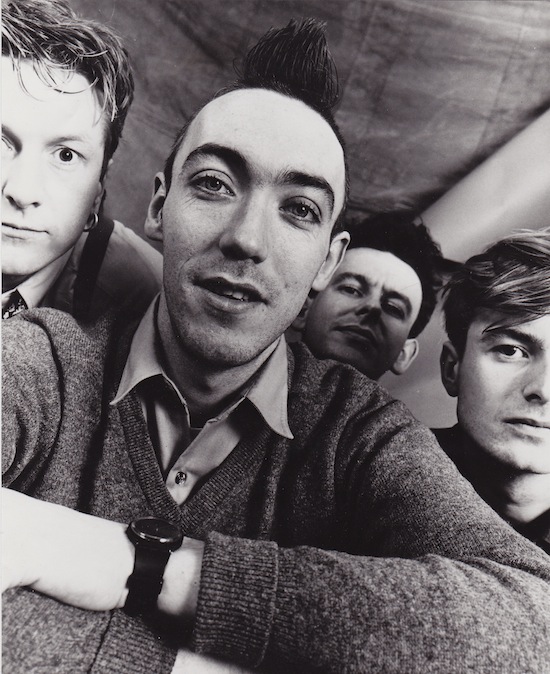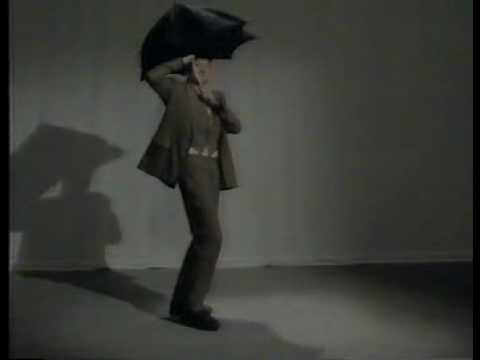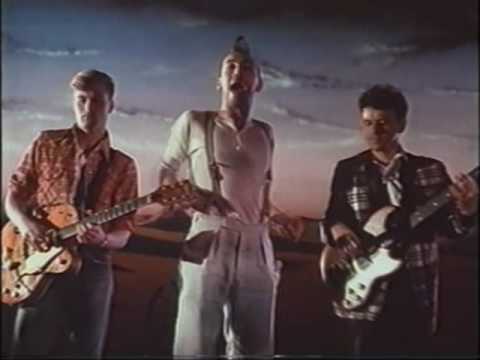June 1987: Husker Dü, Sonic Youth and Stump perform at L’Élysée Montmartre in Paris. Stump have just signed to Phonogram subsidiary Ensign, a record label with an unusual speciality in securing hits for Irish, or Irish-related bands. The Boomtown Rats, The Waterboys and – imminently – Sinead O’Connor all found a home and success at the label, under the tutelage of Nigel Grainger. Stump have also recently appeared on the front cover of Melody Maker, frontman Mick Lynch topless with his Tintin-quiff and the not-exactly-subtle headline ‘Trout Mask Replicants’. The band were darlings of the recently-defunct Tube television series, Peel Session regulars and about to record their major label debut with Mute sampling doyen Holger Hiller at the helm in Hansa Studios with Stephen Street engineering. By all accounts (well, primarily Stump’s staggeringly verbose drummer Rob McKahey), the band "were a fucking powerhouse that night and blew [Sonic Youth and Husker Dü] off the stage".
But by the time of their major label debut, A Fierce Pancake, some 12 months later, Stump were an anachronism. The nature of alternative music, and the people responding to it, had altered radically. In the midst of the summer of love, Stump were still dry humping while everyone else consummated. Stump found themselves strangers in a strange land and their reputation suffered accordingly. Now, with the appearance of Does The Fish Have Chips?, a compilation of the band’s early singles, debut mini-album and assorted demos and compilation appearances, their critical deficit can be addressed. But before all that, let’s go back to the beginning.
And in the beginning there was punk and then there was post punk. But there was also Whitstable and there was also Cork. And in 1982, Kev Hopper and Chris Salmon met during the summer holidays in Whitstable as Hopper completed his studies at the Canterbury College of Art. "My influences were from unfashionable sources," reflects Hopper. "I liked Brand X and especially their bass player Percy Jones and thought I’d love those stylings in a shorter, or more spiky, format. And the Stump sound was just a culmination of the way I play bass and Chris plays guitar. I was fascinated with Chris’ playing when I met him. The thing that made it go together was the pitch bending, me with the fretless bass with a lot of vibrato and Chris with the wang bar. I thought we could put something interesting together from the way the two of us already played."
Meanwhile, some three hundred miles across the Irish Sea, Rob McKahey was playing with a nascent Microdisney, another band with rather unfashionable influences. "They had this whole Hall & Oates, Prefab Sprout thing going on even then," he says. "Which I hated. So I left. And I was just playing drums in Cork and getting nowhere. But I met a woman and fell in love – Victoria Clarke, she’s now with Shane MacGowan – and Victoria and I moved to London and shacked up together."
Not far behind was Mick Lynch who was moving to London for precisely the opposite reason: "I split up with my girlfriend so I moved to London, I sold everything I had and was gone to London within two days with two bags and £100."
By 1985, Chris and Kev were playing together and had begun advertising for a singer and drummer. McKahey was one of the first to answer the ad. "I went down [to meet Kev and Chris] in Peckham," he says. "which was the arsehole of the world to me, and I listened to what they were doing. They had a singer at the time, Nick Hobbs who went on to be singer in the Shrubs. But in those days, I was a bit of a dickhead really. I was very assertive, very pushy and I got rid of Nick because I thought that was a gaping hole in the whole thing. And Kev and Chris were very middle-class, very quiet… but then they were coming up with this music, it was so interesting, such a challenge. We tried to get a singer for ages until eventually I persuaded Mick, whom I’d seen playing in Cork, and he came down. He heard the music, went ‘this is great’ and we were off! His first lyric was ‘Orgasm Way’."
Stump’s first release was the Mud On A Colon EP on the Ron Johnson label in 1986. The four tracks suggest Stump came out of the womb fully formed; the beguiling mélange of thwarted funk, traditional Irish drum rhythms (many of McKahey’s time signature are concomitant with that of Irish jigs, usually performed in 12/8 time) and Lynch’s lyrics, which tended to play continual tricks with the English language, piling up Surrealist imagery with a humorous scorn for syntax. Accordingly, the band’s sound was being continually disrupted from within, a uniquely avant-trad approach quite dissimilar to many of the bands they were lumped in with when included on the NME’s C86 compilation tape. But as a live proposition, the band were even more striking, with Lynch’s gangly, topless, rubber-bodied figure skittering across the stage in what amounted to a physical approximation of the warped music going on beside him. "Stump were a great live band," says Simon Reynolds, one of the band’s early champions in the music press. "Their music was much more lithe and rhythmically beguiling than most of the shambling bands. it felt more loose and inventive rhythmically. And then mainly he was such a charismatic, exuberant, watchable frontman which set them apart from nearly everybody in that scene. They were out to entertain. There was a great sense of humour and delight transmitted by Stump."
The momentum achieved by the band at the time did have its drawbacks though. For one thing, being Irish in London in the 1980s was still quite a dubious proposition, especially when you have a loquacious drummer, unafraid to speak about his political allegiances. "I was very verbal and very Republican and very active – not in a military sense – but in terms of marches," McKahey recalls. "I was shocked at what was going on and in fact, I was so verbal that I got a letter from the House of Commons, from Clare Short, to attend a debate which was artists debating on Northern Ireland. But that culminated in me being stopped at Heathrow and two guys came up in shades and suits, pulled me in and had a full file on me. Me! A fucking drummer! And they had photographs of me at marches, all the clips from my interviews and they wanted to know what I was doing. It was not a very nice experience. And that was me just having a small little brush with the establishment. Some friends of mine were taken in for seven days or so and came out nervous wrecks. I backed off and I quietened down after that. Mick and I had different politics and that became a bone of contention. He would be criticising the war and the motives of the IRA and all the rest; Mick had more of a compassionate view on the whole thing. But he had this thing about the boggy home, the idealistic, filmic landscape. It wasn’t that nice in London at the time and Ireland becomes a spiritual home. Mick’s lyrics had that lovely nostalgic thing going on."
It was a considerable task for Lynch to weave his lyrics in and around the ever-bumpy topography of Stump’s sound yet he consistently managed to do this, invoking and plundering the likes of Wilhelm Reich, Flann O’Brien and Yeats for his meandering exhortations on the human body and psyche. "My lyrics are essentially ballads, I write in ballad time and still do to this day. But Stump had no love songs," he says. "’Grab Hands’ was about the closest you get and that was about obsession! Stay away from this person! Everything was from a very oblique angle. I did my three or four years gobbling everything Flann O’Brien and Myles na gCopaleen [both pseudonyms for the writer Brian O’Nolan] wrote and then Rob was also into him before turning the others onto his writigs, Kev was especially delighted. Flann O’Brien had that European sensibility of the absurd. ‘Boggy Home’ would be my closest song to a love song, it was borne from being in London but desperately wishing to be on top of a mountain in Kerry!"
Quirk Out was released on the band’s own label later that year. Hailed by Melody Maker as "one of the pleasures of 1986", the combination of relentless touring and an infamous Tube appearance with album track ‘Buffalo’ – Lynch bellowing and blaring ‘How much is the fish?’ into an indie catchphrase still remembered some thirty years on – prompted major label interest. "At first, we heard that Ensign were only interested in Mick," Hopper says, "because he was a good frontman and they saw him as the main guy in the band. I wasn’t surprised at this; I can understand why that might be the case. A lot of record company people don’t understand how bands work."
Nevertheless, the full band were taken under the Phonogram wing and set to work on their debut album proper. David Stubbs did the Melody Maker cover story on the and remembers "there was an awkward, smelly, jutting physicality about their songs…I had a descriptive field day with what I saw as the multiple activity crammed into their songs which for me set them far apart from the C86 brigade, who I detested for their studies, grey smallness." But the C86 scene was being quickly dated and Kev Hopper – who was essentially Stump’s "conscience" according to McKahey – had begun working with samplers. The possibilities of the sampler in 1988 was terrifying, it layered and crowded audio data into new densities. Moreover, it terrified the other members of Stump.
"I was into the more avant-garde sample side of things," says Hopper. "But, at the same time, people were starting to slot in great chunks of other people’s records [into their music], looping them and all that, half my friends stopped playing guitars and started programming guitars and using Ataris, including myself. Eventually, I bought an AKAI S900 sampler. It was an absolute murder to program and operate and had about one second of sampling time. I was quite obsessed with sampling, I saw it as the most radical and exciting instrument of its time. The idea to pluck a sound from nature and then turn it into an instrument was a revelation."
"That was a complete fucking disaster" says McKahey of Hopper’s new toy. "He got a sampler and off he went."
Mick Lynch agrees: "When he decided he wasn’t playing bass anymore…for him to do something with the sampler, he had to go away and come back again. It was pre-laptop days and the songwriting just lost its course."
Hopper was insistent on working more samples into the band’s sound and Holger Hiller – fresh from deconstructing the rock idiom with his Oben Im Eck album – was brought on board to oversee what would become A Fierce Pancake. "Unfortunately, there were personality clashes between him and members of the band," reveals Hopper. "It didn’t quite work out, the guys in the band didn’t want to be involved with him as he was saying things like ‘rock & roll is dead’. I didn’t mind him though as I quite like people who are cool and analytical about music."
"Holger Hiller was a total mistake," says McKahey. "I ended up disliking the guy intensely over his insistence on click tracks. A Fierce Pancake isn’t bad, it’s a bit dense. People were listening to it going ‘what the fuck were these guys taking?’ We should have regrouped, hidden away, worked on new music, waited for everything to cool down, start doing smaller gigs."
A Fierce Pancake was eventually patched together with the aid of über producer John Robie, shipped in from New York at an exorbitant cost, and finally Hugh Jones, who had helmed Quirk Out. Despite promising reviews, the album flopped commercially while single ‘Charlton Heston’ – replete with Tim Pope video in which Lynch appeared to eat an unhealthy amount of live frogs – limping into the Top 75 for a week before vanishing again. Clearly, the band were all stretching out in different directions. Hopper was immersed in the possibilities afforded to him by the use of sampling while McKahey wanted Stump to pursue a less abstruse, more conventional musical approach. "My own head was all over the place," he says "because I was hanging around with Shane MacGowan and the Pogues a lot. I was listening to the Pixies, I wanted to simplify things and was tired of the endless complexities of the new material and Kev wanted to do his own music. It was nobody’s fault, just bad judgement."
"It was right in the middle of the rave thing," Hopper now accepts, "where people had lost interest in going to gigs and wanted to get stoned in a field. It did feel a bit strange, Chris and the band think we dropped out of gigging for too long but I think there was a sea change in people’s taste. It was upsetting! If we had just taken a break, the best thing would have been to keep those sampler experiences to myself and then just being the bass player with the band. ‘The Queen And The Pope’ [one of the demos on the new compilation] is classic Stump, it really stands out from those demos. A lot of them were written just with Chris and Mick and then there’s some half-hearted – I think – ideas. There are some good things but, by and large, it could have been better."
Ensign bafflingly decided to release ‘Buffalo’ as a single in late 1988 – some two years after the television appearances on the Tube – to revive the band’s flagging fortunes but this only served to damage inter-band relations even further. The final gig was in Camden’s Electric Ballroom, where the band rattled through an hour long set in twenty five minutes.
"Ensign were desperate when they re-released ‘Buffalo’," Hopper says. "They were quite old fashioned when they thought a ‘hit’ would sustain the band. It was a two year old song, it didn’t feel good for morale to do that. And that last performance was pretty awful, four very impatient people on stage bickering and playing everything really fast. It wasn’t good. There was some relief when we broke up, I just wonder if we’d had a long break at that time whether we would have come back and resumed? The problem was both Mick and Rob had had enough of London."
While Hopper continued with his sampler exploits (check out his wonderful 1989 debut solo album The Sound Of Gyroscopes) and guitarist Chris Salmon embarked on a fine art career, Lynch and McKahey had further opportunities to remain in the game, which seem quite startling in hindsight.
"I had an interview for the Inspiral Carpets that didn’t go very well," Lynch reveals. "I went to meet their management, I wasn’t enamoured by all that Mancunian stuff."
Meawhile, McKahey was busy batting off the advances of even more enamoured indie outfits, clearly in search of a man who could not only play drums but who had an astonishing capacity for self-promotion and talking shite.
"First of all, that last gig was atrocious," McKahey admits. "When the enthusiasm is gone and there’s unhappiness left, you can’t describe it. If you’re Showaddywaddy on tour and your enthusiasm is gone, you can take the money and go home but for us, it wasn’t like that. I broke up with my girlfriend and that Christmas was really miserable, no band, no relationship. But I was contacted by the band James, and there was talk of Primal Scream and The Waterboys; all of them were interested in me drumming for them. And who’s that guy…Cockney Rebel?"
Steve Harley?
"[laughs] Yeah! Him too! I was sick of it all really but James were very persistent and the singer kept ringing me up, ‘Please move to Manchester’ and it was tempting because I’m a Manchester City fan! The three lads were let go by Ensign but they kept me. I was doing these demos, I was trying to do this industrial traditional Irish music. I was listening to Swans at the time – I remember being in the States and swapping my Stump t-shirt for a Swans t-shirt in a record shop, the guys in the shop were delighted! – and what I wanted to do was to marry Swans with traditional Irish voice and melody. And it was those really dark, laments. Minimal melancholic industrial. And I was doing all at home myself with drum machines and singing. And Ensign thought this was fucking great! And said go off and do an album. One of the tracks is ‘King Of A Flat Country’, the Ed Barton song covered on the compilation, you have all that noise with me singing over it. That was the flavour of what I was doing."
Wait a minute. Even leaving aside the utterly perplexing notion of trying to solder Swans together with traditional Irish music, you had the option of joining The Waterboys who were riding high on the raggle taggle revival after Fisherman’s Blues, James, who were on the verge of mega stardom with ‘Sit Down’ and Primal Scream who were also teetering on the precipice of crossover canonisation. And you had a major label record deal!
"I know! And sure I was only the fucking drummer! But it never happened. I met my future wife and I wanted to move back, to home, to Cork."
Does The Fish Have Chips? is out now on Cherry Red records.




